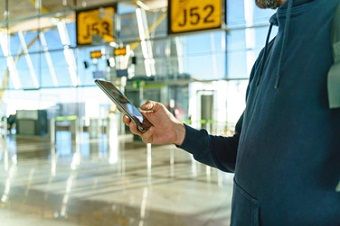The International Air Transport Association (IATA) and its partners have tested mobile phone-based digital travel identity supported by biometric technology on a flight from London to Rome.
IATA says that this is the first digital identity trial that has captured an entire journey, from booking a flight to arrival. The organisation’s goal is to allow passengers to travel just by using a mobile phone digital wallet, loaded with a digital passport, loyalty cards and verifiable travel credentials, according to Nick Careen, IATA’s Senior Vice President for Operations, Safety and Security.
“Our vision for future travel is fully digital and secured with biometric identification,” says Careen. ”While the technology exists to do this at each stage of a journey, linking these steps together has proven challenging. Today with our partners we showed that it is possible.”
A total of 11 companies participated in the trial, including Accenture, Amadeus, Australian Border Force, AWS, Branchspace, British Airways, IDnow, Aeroporti di Roma, SICPA, Trip.com, and Verchaska. During the trial, IATA used its collaborative identity management solution OneID for sharing information and biometric recognition at airports.
The digital travel identity proof of concept was outlined in an IATA paper which explains how a trusted digital identity credential can be created through a digital identity onboarding service provided by an issuer.
The issuer performs the necessary checks, including reading the ePassport chip through Near-Field Communication (NFC) to obtain biometric and biographic data, scanning the passenger’s face for a presentation attack and liveness detection, and biometric authentication during which the passport chip is matched with the person in possession of the phone (1:1 match).
IATA has also been working on digital identity standards based on W3C Verifiable Credentials (VC) and decentralised digital identity that could be interoperable between different stakeholders, such as airlines, travel agents, airports and governments. The organisation has recently released alpha specifications for the W3C VC schema for passport, visa, and the International Civil Aviation Organization (ICAO) Digital Travel Authorization (DTA) for industry testing.
“Success, of course, is underpinned by interoperability and global standards—so the advantage of the digital travel conveniences are available to travellers throughout their journey and wherever it may take them,” says Careen.








